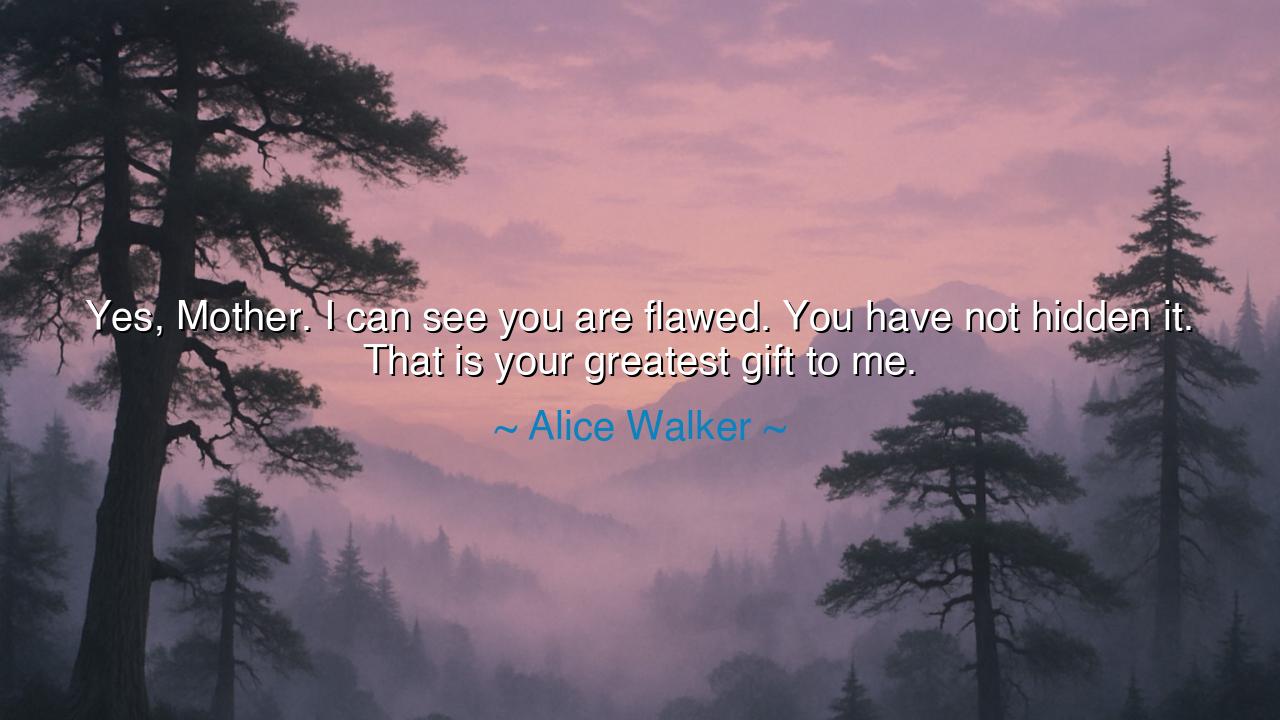
Yes, Mother. I can see you are flawed. You have not hidden it.
Yes, Mother. I can see you are flawed. You have not hidden it. That is your greatest gift to me.






In the luminous and piercing words of Alice Walker, “Yes, Mother. I can see you are flawed. You have not hidden it. That is your greatest gift to me,” we hear the voice of a daughter who has grown wise enough to see her mother not as an ideal, but as a human being. These words carry the weight of compassion and the light of truth. They are not born of disappointment, but of gratitude—for to see one’s mother as flawed and yet still radiant is to grasp the deepest mystery of love. Walker, the poet and prophet of womanhood and selfhood, here reveals that the truest inheritance a mother can leave her child is not perfection, but honesty—the courage to live visibly, imperfectly, and without deceit.
The origin of this quote arises from Alice Walker’s lifelong meditation on her relationship with her mother, a woman of extraordinary endurance and strength who raised eight children in the rural South amid poverty and hardship. In her mother’s hands, Walker saw both beauty and exhaustion—the evidence of labor, sacrifice, and quiet rebellion against a world that demanded too much from her. Yet her mother did not hide her weariness or her flaws; she lived in her truth, vulnerable yet unbroken. Through her openness, she taught her daughter that it is not perfection that makes us worthy of love, but the willingness to be real.
The ancients too understood that truth is the soul’s highest form of beauty. In the teachings of the philosophers, to know oneself and to accept that knowledge was considered the foundation of wisdom. The Greeks carved into their temples: “Know thyself.” And what is motherhood, if not the most profound mirror of self-knowledge? The mother who admits her imperfection offers her child a greater gift than false sainthood—she teaches that to be human is to stumble and to rise again. Through her flawed grace, she frees her children from the tyranny of impossible ideals.
Consider the story of Sojourner Truth, born into slavery yet destined to become a voice for justice. As a mother, she knew sorrow deeper than words—her children were sold from her arms, her body bruised by cruelty. Yet she did not hide her pain, nor did she present herself as untouchable or pure. In her speeches, she spoke of her struggles openly, declaring both her faith and her wounds. Her children, and the world that would come after her, learned from her example that strength does not mean perfection; it means standing, scarred but shining, in the full truth of one’s humanity.
Alice Walker’s words echo this same sacred wisdom: the flawed mother is not a failure but a teacher. The mother who pretends to be flawless creates distance, for she becomes an image rather than a person. But the mother who reveals her fears, her mistakes, her weariness, becomes a bridge of understanding. She gives her child permission to live fully—to fail, to heal, to forgive. In acknowledging her own humanity, she allows her child to embrace theirs. The gift of imperfection is the gift of freedom.
There is profound power in transparency, especially in a world that worships appearance and punishes vulnerability. When a mother allows her child to see her truth—to witness her tears, her doubts, her resilience—she imparts a wisdom greater than any lecture: that life is not a performance, but a pilgrimage. She teaches that worth is not earned through flawlessness, but through courage, through the will to keep loving, creating, and believing despite one’s limitations. Such truth does not diminish love; it deepens it. For only when we see another fully—strengths and frailties entwined—can we love them wholly.
Let this then be the lesson passed down: do not fear your imperfections; let them be your teacher and your offering. Parents, do not hide your humanity from your children, for they learn not from your masks, but from your sincerity. And children, do not resent the flaws of your mothers, for they are the roots of your understanding. Honor them, for they reveal that perfection is a myth and love is the only truth that endures.
Thus, Alice Walker’s words stand as a testament to the sacred balance between love and honesty. The mother’s flaws are not her failure—they are her legacy. They remind us that beauty does not dwell in the absence of weakness, but in the courage to live with open hands and open heart. To see one’s mother clearly, and to love her still, is to see the world as it truly is—imperfect, yet divine. For in the acceptance of our shared humanity lies the deepest form of wisdom: to love, not because we are flawless, but because we are real.






AAdministratorAdministrator
Welcome, honored guests. Please leave a comment, we will respond soon